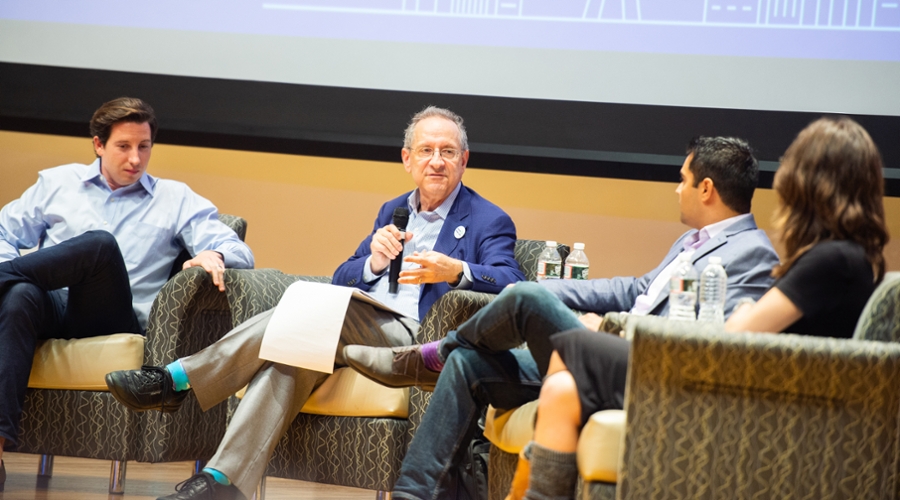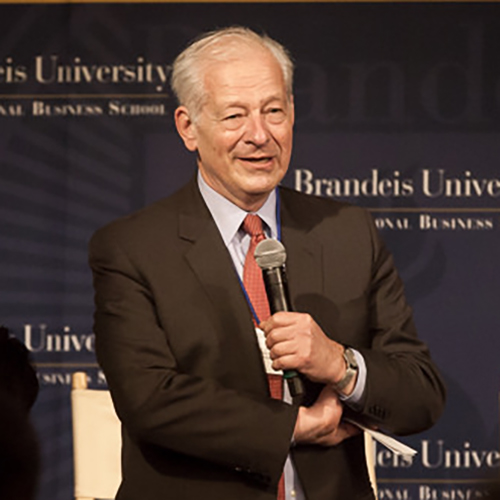Digital technology has upended industry after industry, including television, music, retail and news. But why hasn’t the data revolution overtaken banking and finance?
“I still find it pretty interesting that there’s been substantial technological change out there, but that the banking system we have is pretty similar to the one that was created by the Medici in the 13th century,” said
Stephen Cecchetti, the Rosen Family Chair in International Finance at Brandeis International Business School. “It’s true that I can do things on my phone, but the things I do on my phone are not fundamentally different, they are just a little bit easier.”
While tech is indeed changing how we manage our money — you can buy stocks or deposit checks from anywhere with a phone — it hasn’t produced a seismic shift. Just yet, anyway.
Technology’s influence on finance is everywhere you look, the possibilities are endless, and the transformation of the field through data analytics is imminent. That idea and the question of how to keep up was central to an all-star discussion of the finance and tech industries at
Boston FinTech Week 2019, sponsored by Brandeis International Business School and held at the Federal Reserve Bank of Boston.
During a panel titled “Universities Empowering FinTech,” professors
Daniel Bergstresser and
Debarshi Nandy, the Barbara and Richard M. Rosenberg Professor of Global Finance, offered a compelling case for why schools should reimagine and enhance how they teach the intertwining disciplines that comprise
FinTech.
Colleges and universities have the potential to bridge the gap between finance knowledge and deep technological expertise by encouraging more collaboration both formally and informally at the student level, panelists said.
“There is a lot of opportunity for collaboration at universities in the Boston area, at Brandeis, MIT, Harvard and other places,” said Nandy, who has been instrumental in shaping the International Business School’s new
FinTech concentration.
Nandy also pointed to the importance of helping incubate the next generation of innovative companies. FinTech Sandbox, an International Business School partner that organized FinTech Week 2019, gives startups access to data — the key ingredient in many FinTech innovations — that they otherwise wouldn’t be able to afford.
“Financial data is incredibly expensive,” said Nandy, citing an example from a Boston-area startup’s budget that included, for example, $150 for a desk chair and $100,000 for data. “Allowing startups to use the data for free is one thing we can do.”
Another panel, “The Unicorn: Building and Scaling a Billion-Dollar FinTech,” highlighted some of the headwinds facing new, technology-based financial experiments.
The panel was led by
Michael McKay, a senior advisor at Bain & Company and a senior lecturer at the International Business School. Joining McKay were Michael Tannenbaum, chief financial officer of Brex, a new billion-dollar corporate credit card company that services startups, and Travis Skelly, senior vice president at Citi Ventures.
Although Tannenbaum is a veteran funder of tech startups and helps lead a billion-dollar company, Skelly emphasized that from an institutional lending standpoint, considerable skepticism remains around funding new ventures without a clear path to profit.
Unlike the early 21st century boom in hardware products, FinTech is mostly about using advanced technology to create new services and markets, which takes far longer to monetize than a new line of mobile phones. That can make funding harder to secure.
Judging from the panel moderated by Cecchetti, “FinTech and Digital Currencies,” even as FinTech starts to revolutionize finance, one of the bedrock concerns of every consumer will remain more important than ever: trust.
Cecchetti pointed out that the banking system has been based on that same principle for a half dozen centuries: “If I give you my money, I want to know I’ll get it back.”
That’s a simple, yet difficult, goal for the ever complex, interdependent frontier of FinTech.




